[English] 日本語
 Yorodumi
Yorodumi- EMDB-27227: Cryo-EM map of human CNTF signaling complex with full extracellul... -
+ Open data
Open data
- Basic information
Basic information
| Entry | 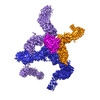 | |||||||||
|---|---|---|---|---|---|---|---|---|---|---|
| Title | Cryo-EM map of human CNTF signaling complex with full extracellular domains: refined from selected full particle dataset, with better resolution in the interaction core region | |||||||||
 Map data Map data | Higher resolution map used for model building | |||||||||
 Sample Sample |
| |||||||||
| Function / homology |  Function and homology information Function and homology informationCNTFR-CLCF1 complex / skeletal muscle organ development /  leukemia inhibitory factor receptor activity / oncostatin-M receptor activity / retinal rod cell differentiation / regulation of retinal cell programmed cell death / muscle organ morphogenesis / leukemia inhibitory factor receptor activity / oncostatin-M receptor activity / retinal rod cell differentiation / regulation of retinal cell programmed cell death / muscle organ morphogenesis /  interleukin-27 receptor activity / oncostatin-M receptor complex / oncostatin-M-mediated signaling pathway ...CNTFR-CLCF1 complex / skeletal muscle organ development / interleukin-27 receptor activity / oncostatin-M receptor complex / oncostatin-M-mediated signaling pathway ...CNTFR-CLCF1 complex / skeletal muscle organ development /  leukemia inhibitory factor receptor activity / oncostatin-M receptor activity / retinal rod cell differentiation / regulation of retinal cell programmed cell death / muscle organ morphogenesis / leukemia inhibitory factor receptor activity / oncostatin-M receptor activity / retinal rod cell differentiation / regulation of retinal cell programmed cell death / muscle organ morphogenesis /  interleukin-27 receptor activity / oncostatin-M receptor complex / oncostatin-M-mediated signaling pathway / interleukin-27 receptor activity / oncostatin-M receptor complex / oncostatin-M-mediated signaling pathway /  ciliary neurotrophic factor receptor activity / ciliary neurotrophic factor receptor activity /  ciliary neurotrophic factor receptor binding / negative regulation of interleukin-6-mediated signaling pathway / leukemia inhibitory factor signaling pathway / ciliary neurotrophic factor receptor binding / negative regulation of interleukin-6-mediated signaling pathway / leukemia inhibitory factor signaling pathway /  interleukin-11 receptor activity / interleukin-11 receptor activity /  interleukin-11 binding / RUNX1 regulates transcription of genes involved in interleukin signaling / negative regulation of photoreceptor cell differentiation / interleukin-11 binding / RUNX1 regulates transcription of genes involved in interleukin signaling / negative regulation of photoreceptor cell differentiation /  ciliary neurotrophic factor receptor complex / interleukin-27-mediated signaling pathway / ciliary neurotrophic factor-mediated signaling pathway / ciliary neurotrophic factor receptor complex / interleukin-27-mediated signaling pathway / ciliary neurotrophic factor-mediated signaling pathway /  interleukin-6 receptor complex / interleukin-6 receptor complex /  interleukin-6 receptor binding / brainstem development / interleukin-11-mediated signaling pathway / T-helper 17 cell lineage commitment / interleukin-6 receptor binding / brainstem development / interleukin-11-mediated signaling pathway / T-helper 17 cell lineage commitment /  sex differentiation / positive regulation of adaptive immune response / positive regulation of acute inflammatory response / positive regulation of astrocyte differentiation / intestinal epithelial cell development / positive regulation of platelet aggregation / negative regulation of motor neuron apoptotic process / Interleukin-35 Signalling / Interleukin-27 signaling / IL-6-type cytokine receptor ligand interactions / sex differentiation / positive regulation of adaptive immune response / positive regulation of acute inflammatory response / positive regulation of astrocyte differentiation / intestinal epithelial cell development / positive regulation of platelet aggregation / negative regulation of motor neuron apoptotic process / Interleukin-35 Signalling / Interleukin-27 signaling / IL-6-type cytokine receptor ligand interactions /  cytokine receptor activity / motor neuron apoptotic process / cytokine receptor activity / motor neuron apoptotic process /  extrinsic component of membrane / glycogen metabolic process / Interleukin-6 signaling / interleukin-6-mediated signaling pathway / positive regulation of Notch signaling pathway / protein tyrosine kinase activator activity / suckling behavior / positive regulation of cardiac muscle hypertrophy / extrinsic component of membrane / glycogen metabolic process / Interleukin-6 signaling / interleukin-6-mediated signaling pathway / positive regulation of Notch signaling pathway / protein tyrosine kinase activator activity / suckling behavior / positive regulation of cardiac muscle hypertrophy /  cytokine binding / positive regulation of axon regeneration / MAPK3 (ERK1) activation / cytokine binding / positive regulation of axon regeneration / MAPK3 (ERK1) activation /  growth factor binding / MAPK1 (ERK2) activation / positive regulation of vascular endothelial growth factor production / neuron development / positive regulation of osteoblast differentiation / growth factor binding / MAPK1 (ERK2) activation / positive regulation of vascular endothelial growth factor production / neuron development / positive regulation of osteoblast differentiation /  coreceptor activity / positive regulation of T cell proliferation / positive regulation of tyrosine phosphorylation of STAT protein / response to cytokine / coreceptor activity / positive regulation of T cell proliferation / positive regulation of tyrosine phosphorylation of STAT protein / response to cytokine /  cytokine activity / astrocyte activation / cytokine activity / astrocyte activation /  growth factor activity / cytokine-mediated signaling pathway / growth factor activity / cytokine-mediated signaling pathway /  nervous system development / nervous system development /  scaffold protein binding / negative regulation of neuron apoptotic process / cell surface receptor signaling pathway / scaffold protein binding / negative regulation of neuron apoptotic process / cell surface receptor signaling pathway /  receptor complex / apical plasma membrane / receptor complex / apical plasma membrane /  membrane raft / membrane raft /  axon / external side of plasma membrane / axon / external side of plasma membrane /  signaling receptor binding / neuronal cell body / signaling receptor binding / neuronal cell body /  dendrite / positive regulation of cell population proliferation / protein-containing complex binding / positive regulation of gene expression / negative regulation of apoptotic process / dendrite / positive regulation of cell population proliferation / protein-containing complex binding / positive regulation of gene expression / negative regulation of apoptotic process /  signal transduction / signal transduction /  extracellular space / extracellular exosome / extracellular region / extracellular space / extracellular exosome / extracellular region /  membrane / identical protein binding / membrane / identical protein binding /  plasma membrane / plasma membrane /  cytoplasm cytoplasmSimilarity search - Function | |||||||||
| Biological species |   Homo sapiens (human) Homo sapiens (human) | |||||||||
| Method |  single particle reconstruction / single particle reconstruction /  cryo EM / Resolution: 3.03 Å cryo EM / Resolution: 3.03 Å | |||||||||
 Authors Authors | Zhou Y / Franklin MC | |||||||||
| Funding support | 1 items
| |||||||||
 Citation Citation |  Journal: Sci Adv / Year: 2023 Journal: Sci Adv / Year: 2023Title: Structural insights into the assembly of gp130 family cytokine signaling complexes. Authors: Yi Zhou / Panayiotis E Stevis / Jing Cao / Kei Saotome / Jiaxi Wu / Arielle Glatman Zaretsky / Sokol Haxhinasto / George D Yancopoulos / Andrew J Murphy / Mark W Sleeman / William C Olson / Matthew C Franklin /  Abstract: The interleukin-6 (IL-6) family cytokines signal through gp130 receptor homodimerization or heterodimerization with a second signaling receptor and play crucial roles in various cellular processes. ...The interleukin-6 (IL-6) family cytokines signal through gp130 receptor homodimerization or heterodimerization with a second signaling receptor and play crucial roles in various cellular processes. We determined cryo-electron microscopy structures of five signaling complexes of this family, containing full receptor ectodomains bound to their respective ligands ciliary neurotrophic factor, cardiotrophin-like cytokine factor 1 (CLCF1), leukemia inhibitory factor, IL-27, and IL-6. Our structures collectively reveal similarities and differences in the assembly of these complexes. The acute bends at both signaling receptors in all complexes bring the membrane-proximal domains to a ~30 angstrom range but with distinct distances and orientations. We also reveal how CLCF1 engages its secretion chaperone cytokine receptor-like factor 1. Our data provide valuable insights for therapeutically targeting gp130-mediated signaling. | |||||||||
| History |
|
- Structure visualization
Structure visualization
| Supplemental images |
|---|
- Downloads & links
Downloads & links
-EMDB archive
| Map data |  emd_27227.map.gz emd_27227.map.gz | 125.3 MB |  EMDB map data format EMDB map data format | |
|---|---|---|---|---|
| Header (meta data) |  emd-27227-v30.xml emd-27227-v30.xml emd-27227.xml emd-27227.xml | 18.7 KB 18.7 KB | Display Display |  EMDB header EMDB header |
| Images |  emd_27227.png emd_27227.png | 107.4 KB | ||
| Others |  emd_27227_half_map_1.map.gz emd_27227_half_map_1.map.gz emd_27227_half_map_2.map.gz emd_27227_half_map_2.map.gz | 226.7 MB 226.7 MB | ||
| Archive directory |  http://ftp.pdbj.org/pub/emdb/structures/EMD-27227 http://ftp.pdbj.org/pub/emdb/structures/EMD-27227 ftp://ftp.pdbj.org/pub/emdb/structures/EMD-27227 ftp://ftp.pdbj.org/pub/emdb/structures/EMD-27227 | HTTPS FTP |
-Related structure data
| Related structure data | 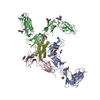 8d74MC 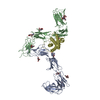 8d6aC 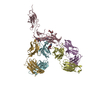 8d7eC  8d7hC 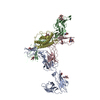 8d7rC  8d82C  8d85C M: atomic model generated by this map C: citing same article ( |
|---|---|
| Similar structure data | Similarity search - Function & homology  F&H Search F&H Search |
- Links
Links
| EMDB pages |  EMDB (EBI/PDBe) / EMDB (EBI/PDBe) /  EMDataResource EMDataResource |
|---|---|
| Related items in Molecule of the Month |
- Map
Map
| File |  Download / File: emd_27227.map.gz / Format: CCP4 / Size: 244.1 MB / Type: IMAGE STORED AS FLOATING POINT NUMBER (4 BYTES) Download / File: emd_27227.map.gz / Format: CCP4 / Size: 244.1 MB / Type: IMAGE STORED AS FLOATING POINT NUMBER (4 BYTES) | ||||||||||||||||||||
|---|---|---|---|---|---|---|---|---|---|---|---|---|---|---|---|---|---|---|---|---|---|
| Annotation | Higher resolution map used for model building | ||||||||||||||||||||
| Voxel size | X=Y=Z: 0.85 Å | ||||||||||||||||||||
| Density |
| ||||||||||||||||||||
| Symmetry | Space group: 1 | ||||||||||||||||||||
| Details | EMDB XML:
|
-Supplemental data
-Half map: half map A
| File | emd_27227_half_map_1.map | ||||||||||||
|---|---|---|---|---|---|---|---|---|---|---|---|---|---|
| Annotation | half map A | ||||||||||||
| Projections & Slices |
| ||||||||||||
| Density Histograms |
-Half map: half map B
| File | emd_27227_half_map_2.map | ||||||||||||
|---|---|---|---|---|---|---|---|---|---|---|---|---|---|
| Annotation | half map B | ||||||||||||
| Projections & Slices |
| ||||||||||||
| Density Histograms |
- Sample components
Sample components
-Entire : Human CNTF in complex with CNTFR alpha, gp130, and LIFR
| Entire | Name: Human CNTF in complex with CNTFR alpha, gp130, and LIFR |
|---|---|
| Components |
|
-Supramolecule #1: Human CNTF in complex with CNTFR alpha, gp130, and LIFR
| Supramolecule | Name: Human CNTF in complex with CNTFR alpha, gp130, and LIFR type: complex / ID: 1 / Chimera: Yes / Parent: 0 / Macromolecule list: #1-#4 |
|---|---|
| Source (natural) | Organism:   Homo sapiens (human) Homo sapiens (human) |
-Macromolecule #1: Interleukin-6 receptor subunit beta
| Macromolecule | Name: Interleukin-6 receptor subunit beta / type: protein_or_peptide / ID: 1 / Number of copies: 1 / Enantiomer: LEVO |
|---|---|
| Source (natural) | Organism:   Homo sapiens (human) Homo sapiens (human) |
| Molecular weight | Theoretical: 71.233203 KDa |
| Recombinant expression | Organism:   Cricetulus griseus (Chinese hamster) Cricetulus griseus (Chinese hamster) |
| Sequence | String: ELLDPCGYIS PESPVVQLHS NFTAVCVLKE KCMDYFHVNA NYIVWKTNHF TIPKEQYTII NRTASSVTFT DIASLNIQLT CNILTFGQL EQNVYGITII SGLPPEKPKN LSCIVNEGKK MRCEWDGGRE THLETNFTLK SEWATHKFAD CKAKRDTPTS C TVDYSTVY ...String: ELLDPCGYIS PESPVVQLHS NFTAVCVLKE KCMDYFHVNA NYIVWKTNHF TIPKEQYTII NRTASSVTFT DIASLNIQLT CNILTFGQL EQNVYGITII SGLPPEKPKN LSCIVNEGKK MRCEWDGGRE THLETNFTLK SEWATHKFAD CKAKRDTPTS C TVDYSTVY FVNIEVWVEA ENALGKVTSD HINFDPVYKV KPNPPHNLSV INSEELSSIL KLTWTNPSIK SVIILKYNIQ YR TKDASTW SQIPPEDTAS TRSSFTVQDL KPFTEYVFRI RCMKEDGKGY WSDWSEEASG ITYEDRPSKA PSFWYKIDPS HTQ GYRTVQ LVWKTLPPFE ANGKILDYEV TLTRWKSHLQ NYTVNATKLT VNLTNDRYLA TLTVRNLVGK SDAAVLTIPA CDFQ ATHPV MDLKAFPKDN MLWVEWTTPR ESVKKYILEW CVLSDKAPCI TDWQQEDGTV HRTYLRGNLA ESKCYLITVT PVYAD GPGS PESIKAYLKQ APPSKGPTVR TKKVGKNEAV LEWDQLPVDV QNGFIRNYTI FYRTIIGNET AVNVDSSHTE YTLSSL TSD TLYMVRMAAY TDEGGKDGPE FTFTTPKFAQ GEIEEQKLIS EEDLGGEQKL ISEEDLHHHH HH |
-Macromolecule #2: Ciliary neurotrophic factor
| Macromolecule | Name: Ciliary neurotrophic factor / type: protein_or_peptide / ID: 2 / Number of copies: 1 / Enantiomer: LEVO |
|---|---|
| Source (natural) | Organism:   Homo sapiens (human) Homo sapiens (human) |
| Molecular weight | Theoretical: 24.704854 KDa |
| Recombinant expression | Organism:   Cricetulus griseus (Chinese hamster) Cricetulus griseus (Chinese hamster) |
| Sequence | String: MAFTEHSPLT PHRRDLCSRS IWLARKIRSD LTALTESYVK HQGLNKNINL DSADGMPVAS TDQWSELTEA ERLQENLQAY RTFHVLLAR LLEDQQVHFT PTEGDFHQAI HTLLLQVAAF AYQIEELMIL LEYKIPRNEA DGMPINVGDG GLFEKKLWGL K VLQELSQW ...String: MAFTEHSPLT PHRRDLCSRS IWLARKIRSD LTALTESYVK HQGLNKNINL DSADGMPVAS TDQWSELTEA ERLQENLQAY RTFHVLLAR LLEDQQVHFT PTEGDFHQAI HTLLLQVAAF AYQIEELMIL LEYKIPRNEA DGMPINVGDG GLFEKKLWGL K VLQELSQW TVRSIHDLRF ISSHQTGIEQ KLISEEDLGG EQKLISEEDL HHHHHH |
-Macromolecule #3: Ciliary neurotrophic factor receptor subunit alpha
| Macromolecule | Name: Ciliary neurotrophic factor receptor subunit alpha / type: protein_or_peptide / ID: 3 / Number of copies: 1 / Enantiomer: LEVO |
|---|---|
| Source (natural) | Organism:   Homo sapiens (human) Homo sapiens (human) |
| Molecular weight | Theoretical: 35.855305 KDa |
| Recombinant expression | Organism:   Cricetulus griseus (Chinese hamster) Cricetulus griseus (Chinese hamster) |
| Sequence | String: QRHSPQEAPH VQYERLGSDV TLPCGTANWD AAVTWRVNGT DLAPDLLNGS QLVLHGLELG HSGLYACFHR DSWHLRHQVL LHVGLPPRE PVLSCRSNTY PKGFYCSWHL PTPTYIPNTF NVTVLHGSKI MVCEKDPALK NRCHIRYMHL FSTIKYKVSI S VSNALGHN ...String: QRHSPQEAPH VQYERLGSDV TLPCGTANWD AAVTWRVNGT DLAPDLLNGS QLVLHGLELG HSGLYACFHR DSWHLRHQVL LHVGLPPRE PVLSCRSNTY PKGFYCSWHL PTPTYIPNTF NVTVLHGSKI MVCEKDPALK NRCHIRYMHL FSTIKYKVSI S VSNALGHN ATAITFDEFT IVKPDPPENV VARPVPSNPR RLEVTWQTPS TWPDPESFPL KFFLRYRPLI LDQWQHVELS DG TAHTITD AYAGKEYIIQ VAAKDNEIGT WSDWSVAAHA TPWTEEPRHL TTEAQAAETT TSTTSSLAPP PTTKICDPGE LGS |
-Macromolecule #4: Leukemia inhibitory factor receptor
| Macromolecule | Name: Leukemia inhibitory factor receptor / type: protein_or_peptide / ID: 4 / Number of copies: 1 / Enantiomer: LEVO |
|---|---|
| Source (natural) | Organism:   Homo sapiens (human) Homo sapiens (human) |
| Molecular weight | Theoretical: 92.834812 KDa |
| Recombinant expression | Organism:   Cricetulus griseus (Chinese hamster) Cricetulus griseus (Chinese hamster) |
| Sequence | String: QKKGAPHDLK CVTNNLQVWN CSWKAPSGTG RGTDYEVCIE NRSRSCYQLE KTSIKIPALS HGDYEITINS LHDFGSSTSK FTLNEQNVS LIPDTPEILN LSADFSTSTL YLKWNDRGSV FPHRSNVIWE IKVLRKESME LVKLVTHNTT LNGKDTLHHW S WASDMPLE ...String: QKKGAPHDLK CVTNNLQVWN CSWKAPSGTG RGTDYEVCIE NRSRSCYQLE KTSIKIPALS HGDYEITINS LHDFGSSTSK FTLNEQNVS LIPDTPEILN LSADFSTSTL YLKWNDRGSV FPHRSNVIWE IKVLRKESME LVKLVTHNTT LNGKDTLHHW S WASDMPLE CAIHFVEIRC YIDNLHFSGL EEWSDWSPVK NISWIPDSQT KVFPQDKVIL VGSDITFCCV SQEKVLSALI GH TNCPLIH LDGENVAIKI RNISVSASSG TNVVFTTEDN IFGTVIFAGY PPDTPQQLNC ETHDLKEIIC SWNPGRVTAL VGP RATSYT LVESFSGKYV RLKRAEAPTN ESYQLLFQML PNQEIYNFTL NAHNPLGRSQ STILVNITEK VYPHTPTSFK VKDI NSTAV KLSWHLPGNF AKINFLCEIE IKKSNSVQEQ RNVTIKGVEN SSYLVALDKL NPYTLYTFRI RCSTETFWKW SKWSN KKQH LTTEASPSKG PDTWREWSSD GKNLIIYWKP LPINEANGKI LSYNVSCSSD EETQSLSEIP DPQHKAEIRL DKNDYI ISV VAKNSVGSSP PSKIASMEIP NDDLKIEQVV GMGKGILLTW HYDPNMTCDY VIKWCNSSRS EPCLMDWRKV PSNSTET VI ESDEFRPGIR YNFFLYGCRN QGYQLLRSMI GYIEELAPIV APNFTVEDTS ADSILVKWED IPVEELRGFL RGYLFYFG K GERDTSKMRV LESGRSDIKV KNITDISQKT LRIADLQGKT SYHLVLRAYT DGGVGPEKSM YVVTKENSEQ KLISEEDLG GEQKLISEED LHHHHHH |
-Macromolecule #6: 2-acetamido-2-deoxy-beta-D-glucopyranose
| Macromolecule | Name: 2-acetamido-2-deoxy-beta-D-glucopyranose / type: ligand / ID: 6 / Number of copies: 6 / Formula: NAG |
|---|---|
| Molecular weight | Theoretical: 221.208 Da |
| Chemical component information |  ChemComp-NAG: |
-Experimental details
-Structure determination
| Method |  cryo EM cryo EM |
|---|---|
 Processing Processing |  single particle reconstruction single particle reconstruction |
| Aggregation state | particle |
- Sample preparation
Sample preparation
| Buffer | pH: 7.5 |
|---|---|
| Vitrification | Cryogen name: ETHANE |
- Electron microscopy
Electron microscopy
| Microscope | FEI TITAN KRIOS |
|---|---|
| Electron beam | Acceleration voltage: 300 kV / Electron source:  FIELD EMISSION GUN FIELD EMISSION GUN |
| Electron optics | Illumination mode: FLOOD BEAM / Imaging mode: BRIGHT FIELD Bright-field microscopy / Nominal defocus max: 2.6 µm / Nominal defocus min: 1.4000000000000001 µm Bright-field microscopy / Nominal defocus max: 2.6 µm / Nominal defocus min: 1.4000000000000001 µm |
| Image recording | Film or detector model: GATAN K3 BIOQUANTUM (6k x 4k) / Average electron dose: 40.0 e/Å2 |
| Experimental equipment |  Model: Titan Krios / Image courtesy: FEI Company |
- Image processing
Image processing
| Initial angle assignment | Type: RANDOM ASSIGNMENT |
|---|---|
| Final angle assignment | Type: MAXIMUM LIKELIHOOD |
| Final reconstruction | Applied symmetry - Point group: C1 (asymmetric) / Resolution.type: BY AUTHOR / Resolution: 3.03 Å / Resolution method: FSC 0.143 CUT-OFF / Number images used: 250735 |
 Movie
Movie Controller
Controller
















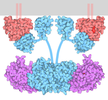


 Z
Z Y
Y X
X

















